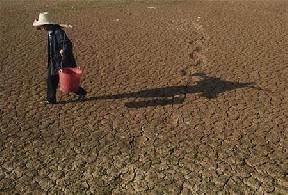Chinese farmers struggle with climate change
China
Friday 18 December 2009
Across the brown hills of Zhongzhuang Village in northwest China, farmers count the costs of a changing climate in lost crops, dry wells and lives weighed down by poverty.
Across the brown hills of Zhongzhuang Village in northwest China, farmers count the costs of a changing climate in lost crops, dry wells and lives weighed down by poverty.
Villagers here plough their narrow, terraced fields dug into the brittle slopes much as they have for generations, with wooden ploughs and donkeys. But the seemingly timeless rhythms of this village in Yongjing County, Gansu province, have been changing.
Over the past 20 years, summers have become hotter and drier, rains now come later and droughts more often, and winter now sets in late and mild enough so farmers can grow corn, which would not mature here 10 or more years ago, said Pu Yanjun, resting at midday from plowing his soil before winter. "Water is our biggest problem, Gansu, they say, has nine years of drought every 10 years," he said, hunkered over a lunch of flat bread and potatoes in his neat courtyard home. "Now the rain often doesn't come when we need it, and then it rains when we don't need it. If it rains now, it will be useless anyway."
The threats from climate change for areas such as Zhongzhuang are at the heart of negotiations 6,843 km (4252 miles) away in Copenhagen, where leaders will be locked in talks this week seeking a new international pact on fighting global warming.
Greenhouse gases from human activity are trapping more solar heat in the air, feeding planetary warming likely to stoke droughts, disrupt rainfall, and threaten crops in many areas.
For China, with its 750 million strong farming population, such changes could strain food security in coming decades. Poor villages in environmentally stressed areas such as Yongjing County are likely to suffer first and worst. "Once you get into the remote communities in poorer parts of China, people are very exposed to climate hazards," said Declan Conway, an expert on climate change and agriculture at the University of East Anglia in Britain who has studied what could happen to China's farmers.
"Those people are already quite vulnerable, and it's quite likely that with an increase in the frequency of extreme weather events, they're going to feel it more in the future."
y, despite government programs to raise incomes and improve water availability, found a recent study of Yongjing and other vulnerable parts of China sponsored by Oxfam and Greenpeace.





